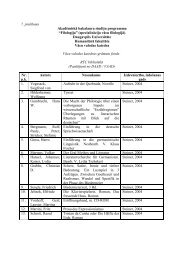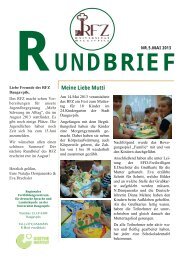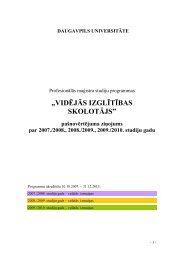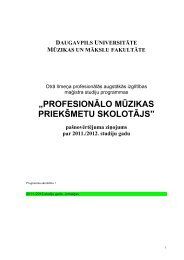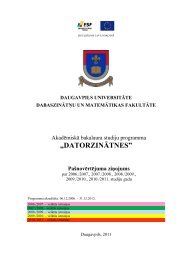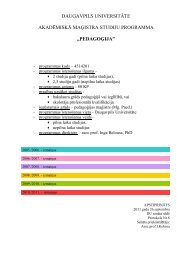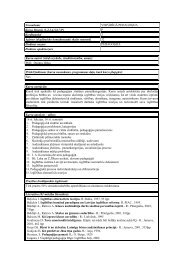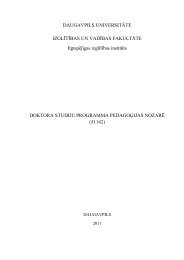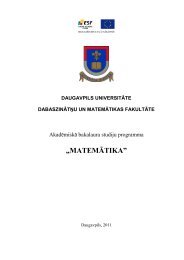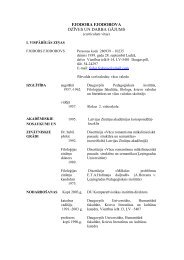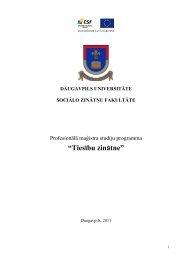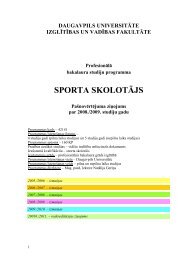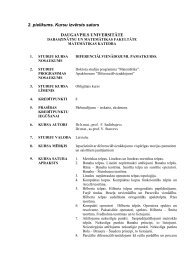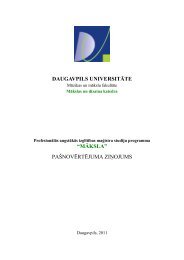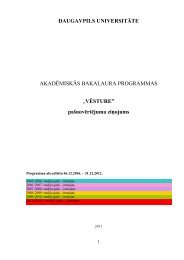- Page 1 and 2:
DAUGAVPILS UNIVERSITĀTE MŪZIKAS U
- Page 3 and 4:
SATURS 1. STUDIJU PROGRAMMAS MĒRĶ
- Page 5 and 6:
pedagoģija un psihiloģija; mūzik
- Page 7 and 8:
Studiju programma tiek realizēta p
- Page 9 and 10:
ieskaite Mg.paed., lekt. V. Bagirja
- Page 11 and 12:
5. Diriģēšana 6 6. Solo dziedā
- Page 13 and 14:
metodisko literatūru, veidojot teo
- Page 15 and 16:
Mūzikas mācību metodika Vispār
- Page 17 and 18:
Studiju programmas realizēšanā i
- Page 19 and 20:
2008./2009.st.g. Mūzikas skolotāj
- Page 21 and 22:
Znutiľš E.(2010). 3. Starptautisk
- Page 23 and 24:
Cieša zinātniskā sadarbība ir i
- Page 25 and 26:
Mūzikas mācību metodikas valsts
- Page 27 and 28:
spēles un mūzikas teorijas katedr
- Page 29 and 30:
Diriģēšanas mākslas attīstība
- Page 31 and 32:
2010.g. un 2011.g. tika piedāvāta
- Page 33 and 34:
2. zīmējums Studentu viedoklis pa
- Page 35 and 36:
2 - 3 gadu laikā savā specialitā
- Page 37 and 38:
8. Studiju programmas akadēmiskais
- Page 39 and 40:
Latvijas Nacionālās operas solist
- Page 41 and 42:
10.2. Auditorijas, laboratorijas, k
- Page 43 and 44:
- 4 fļīģeli Petrow - 1 akordeons
- Page 45 and 46:
11.2. Sadarbība ar līdzīgām stu
- Page 47 and 48:
KP - 160 KP - 180 KP - 160 160 KP 1
- Page 49 and 50:
* docētāju zinātniskā un metodi
- Page 51 and 52:
Nr p.k. Kursa nosaukums Kursa pārb
- Page 53 and 54:
n.p. k Kursa nosaukums Profesionāl
- Page 55 and 56:
n.p. k Kursa nosaukums PRAKSES: Kur
- Page 57 and 58:
Nr p.k. PROFESIONĀLO STUDIJU PROGR
- Page 59 and 60:
BRĪVĀS IZVĒLES STUDIJU KURSI - 6
- Page 61 and 62:
PROFESIONĀLĀS SPECIALIZĀCIJAS KU
- Page 63 and 64:
43. Ģitāras spēle 6 36 2 2 44.
- Page 65 and 66:
Nr p.k. Kursa nosaukums Kursa pārb
- Page 67 and 68:
Apzīmējumi studiju plānā: Slīp
- Page 69 and 70:
6. Koris un kora darba metodika Dif
- Page 71 and 72:
1. Mūzikas mācību metodika Eks.
- Page 73 and 74:
Apzīmējumi studiju plānā: Slīp
- Page 75 and 76:
MākZ2006 Mūzika un dators Dif.ies
- Page 77 and 78:
MākZ3129 Ērģeļu spēle Dif.iesk
- Page 79 and 80:
MākZ4104 Sintezatora spēle Dif.ie
- Page 81 and 82:
MākZ1165 Pūšamais instruments di
- Page 83 and 84:
MākZ2092 Solo dziedāšana un vok
- Page 85 and 86:
7.sem. A daļa [KrP: 1] - KOPĀ: 20
- Page 87 and 88:
2.PIELIKUMS Studiju programmas akad
- Page 89 and 90:
Profesionālā pilnveide Tālākizg
- Page 91 and 92:
2003. g. 13.janvāris - 6. marts Kv
- Page 93 and 94:
05- 23/2006-7 09.05.2008. praksē.
- Page 95 and 96:
2009. gada meistarklases vadīja LN
- Page 97 and 98:
Larionova, J., Bagirjane, V. (2011)
- Page 99 and 100:
Daugulis Ē., Zavadska G. , 2006. P
- Page 101 and 102:
Davidova J. Psychological pedagogic
- Page 103 and 104:
Davidova, J. & Minakova, T. (2009)
- Page 105 and 106:
T. Dvorecka, (2009) Некотор
- Page 107 and 108:
Ērliha S. (2009) Jauniešu vērtī
- Page 109 and 110:
Dzintra Iliško Iliško Dz., Dombro
- Page 111 and 112:
J.Larionova Some problems of creati
- Page 113 and 114:
Oļehnoviča E. Lietišķās māksl
- Page 115 and 116:
Philosophy of Education for Sustain
- Page 117 and 118:
Zavadska G. Some Aspects of Music T
- Page 119 and 120:
Znutiľš E., Davidova J. Mūzikas
- Page 121 and 122:
jauktajā korī ―Daugava‖, vīr
- Page 123 and 124:
2009 .g. 24.februāra - LNO viesizr
- Page 125 and 126:
(koncertmeistare), DU, 15.04.08. 20
- Page 127 and 128:
2009 - Vokalistu festivāls-konkurs
- Page 129 and 130:
2007- J.Larionovas klavierklases st
- Page 131 and 132:
2008. g. Gada noslēguma koncerts D
- Page 133 and 134:
2008.g. Koncerts Daugavpils Mūzika
- Page 135 and 136:
2007.g. P.Plakidim - 60 - jubilejas
- Page 137 and 138:
Oskara Stroka jubilejai veltīts ko
- Page 139 and 140:
Koncerts „P. Plakidim - 60‘ 13.
- Page 141 and 142:
Tatjanas Dvoreckas klases studentu
- Page 143 and 144:
M. Zariľa jubilejas koncerts konce
- Page 145 and 146:
ietvaros koncerts Sv.Trīsvienības
- Page 147 and 148:
Uzsākta sadarbība ar Kauľas Tehn
- Page 149 and 150:
Kursa plāns: 1. 20. gadsimta 1. pu
- Page 151 and 152:
Contemporary music and its the deve
- Page 153 and 154:
Kursa saturs: semestris tēma. Latv
- Page 155 and 156:
Grāvītis O., 1989. Dziesmu svētk
- Page 157 and 158:
2. Viduslaiku mūzika. 2L. 3. Renes
- Page 159 and 160:
The course is envisaged for the stu
- Page 161 and 162:
2. Mūzika 19.gadsimta vidusposmā.
- Page 163 and 164:
6.semestris tēma. Mūzika 19.gadsi
- Page 165 and 166:
Kursa anotācija: Kursa mērķis: s
- Page 167 and 168:
lekcija. Septakordu struktūras un
- Page 169 and 170:
profesionālajā un citos dzīves a
- Page 171 and 172:
Papildliteratūra: Balsons, M. (199
- Page 173 and 174:
Hromatiskās modulācijas. Kompleks
- Page 175 and 176:
Daugulis Ē. Harmonijas mācības a
- Page 177 and 178:
9.tēma Melodijas brīvās harmoniz
- Page 179 and 180:
Dr. art. Ēvalds Daugulis, profesor
- Page 181 and 182:
Dr. art. Ēvalds Daugulis, profesor
- Page 183 and 184:
Цуккерман В. Анализ
- Page 185 and 186:
Bogatirjova J. Harmonijas analīzes
- Page 187 and 188:
Zināšanas Prasmes Kompetence - de
- Page 189 and 190:
Nr. Temats 4 semestris (0,5 KP) 1.
- Page 191 and 192:
plānojums un tā īpatnības ārpu
- Page 193 and 194:
Kora diriģēšanas katedra Kursa n
- Page 195 and 196:
Prasības kredītpunktu iegūšanai
- Page 197 and 198:
5.semestrī apgūstami 3 kora skaľ
- Page 199 and 200:
Literatūra: Bašs M. Diriģēšana
- Page 201 and 202:
mēģinājumos. Prasības kredītpu
- Page 203 and 204:
Semināru, praktisko vai laboratori
- Page 205 and 206:
хорами. Москва: Муз
- Page 207 and 208:
9. Mutācija, tās posmi un izpausm
- Page 209 and 210:
Rezultāti: Apguvuši studiju kursu
- Page 211 and 212:
Profesionālās studiju programmas
- Page 213 and 214:
Nr. Temats I KURSS II SEMESTRIS 1 K
- Page 215 and 216:
Mūzikas saule Māksla plus Kādām
- Page 217 and 218:
- klasiskā stila skaľdarbs (viens
- Page 219 and 220:
K.Boms Perpetuum mobile. N.Miļšte
- Page 221 and 222:
E.Aarne Pārdomas, Humoreska E.Arro
- Page 223 and 224:
Krievu komponistu skandarbi: A.Boro
- Page 225 and 226:
attīstību. Sagaidamā kompetence
- Page 227 and 228:
Mācību pamatliteratūra 1. Avoti
- Page 229 and 230:
Vērtējums: darbs semestrī (ieska
- Page 231 and 232:
6. Daţādu ţanru un stilu sitamin
- Page 233 and 234:
orientēties mūzikas izteiksmes l
- Page 235 and 236:
aptver vokālās tehnikas, izpildī
- Page 237 and 238:
semestrī) Zinātnes nozare Māksla
- Page 239 and 240:
Kredītpunkti 6 ECTS kredītpunkti
- Page 241 and 242: Аниселис Ф. Пьесы д
- Page 243 and 244: iestudējot klavierskaľdarbos; da
- Page 245 and 246: F.Kuperēns. - Maskas 1-10. G.F.Tel
- Page 247 and 248: S.Baľevičs. - Kais un Herda, Zald
- Page 249 and 250: ECTS kredītpunkti 8,5 Kopējais au
- Page 251 and 252: 3. semestris 1. Skolas repertuārs:
- Page 253 and 254: L.Garūta. - Etīdes h moll, cis mo
- Page 255 and 256: 18. Salaks V. - Latviešu tautas dz
- Page 257 and 258: Spruce G. Teaching Music. - London,
- Page 259 and 260: Kursa struktūra: praktiskās nodar
- Page 261 and 262: ear, emotional feel and imagination
- Page 263 and 264: Zinātľu nozare vai apakšnozare P
- Page 265 and 266: Dewey, J. (1916) Democracy and Educ
- Page 267 and 268: uzdevumu prezentēšana (50%) un vi
- Page 269 and 270: Audzināšanas metodes un paľēmie
- Page 271 and 272: Discourse. Kursa nosaukums Sociāl
- Page 273 and 274: 3. Saskarsme kā mijattiecību sist
- Page 275 and 276: Kursa autors Vārds Uzvārds Person
- Page 277 and 278: Kursa līmenis: 1-4 bakalaura; 1 Pr
- Page 279 and 280: Петрушин В. (1997) Муз
- Page 281 and 282: Prasības kredītpunktu iegūšanai
- Page 283 and 284: par bērna un pusaudţa organisma s
- Page 285 and 286: Nacionālais apgāds, 2007 3. Mauri
- Page 287 and 288: Attīstošais darbs kā domāšanas
- Page 289 and 290: akstīšanā profesionālu tēmu jo
- Page 291: Kursa nosaukums Pasaules kultūras
- Page 295 and 296: 2. Vokālo skaľdarbu pārlikumu ve
- Page 297 and 298: Zināšanas Prasmes Kompetence - de
- Page 299 and 300: Tehnika: elpošanas tips, rezonator
- Page 301 and 302: 1. Airaksinens,Tims. Filosofijas pa
- Page 303 and 304: Nosaukums Ētika Kursa līmenis (1,
- Page 305 and 306: www.delfi.lv Kādām studiju progra
- Page 307 and 308: 6. Darbības vārda saliktā tagadn
- Page 309 and 310: Semināru un praktisko darbu stundu
- Page 311 and 312: 2. Kūle M. Eirodzīve. Rīga, 2006
- Page 313 and 314: www.kultura.lv www.lmic.lv www.thea
- Page 315 and 316: Praktiskās nodarbības: Vokāli in
- Page 317 and 318: 5. Tirgus mehānisma nepilnības un
- Page 319 and 320: To teach the principle economic cat
- Page 321 and 322: Par šī Līguma noteikumu neievēr
- Page 323 and 324: Aizstāvēto bakalaura darbu saraks
- Page 325 and 326: 5. I. Kotāne 6. K. Demko - Senkān
- Page 327 and 328: 4. Grīnbauma Līga Tēmas nosaukum
- Page 329 and 330: 7. PIELIKUMS Studējošo aptaujas a
- Page 331 and 332: 2007./2008. STUDIJU GADS Fakultāte
- Page 333 and 334: DAUGAVPILS UNIVERSITĀTES STUDENTU
- Page 335 and 336: Ekonomikas pamati/ civilzinību pam
- Page 337 and 338: Solo dziedāšana un vokālā darba
- Page 339 and 340: DAUGAVPILS UNIVERSITĀTES STUDENTU
- Page 341 and 342: 2 Vai Jūs apmierina izvēlētā st
- Page 343 and 344:
„=‖ - 83% Papildinstruments 4,5
- Page 345 and 346:
Vokālais ansamblis un vokālā dar
- Page 347 and 348:
Instrumentācija un pavadījuma sp
- Page 349 and 350:
2. Vai Jūs apmierina izvēlētā s
- Page 351 and 352:
Vokālais ansamblis un vokālā dar
- Page 353 and 354:
Pielikums DAUGAVPILS UNIVERSITĀTES
- Page 355 and 356:
Kompozīcija un improvizācija 5,00
- Page 357 and 358:
9.PIELIKUMS Pašizvērtējuma ziľo
- Page 359 and 360:
A4 A5 Darba algas fonda aprēķins
- Page 361 and 362:
A3 A4 A5 Amats Personāla vidējā



